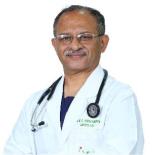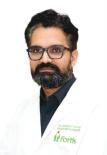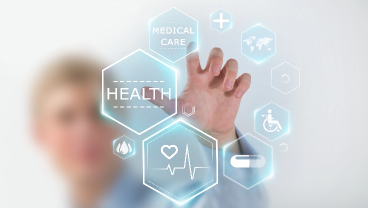About Non-Invasive Cardiology
Non-invasive cardiology is a branch of medical science focusing on diagnosing and treating heart diseases without surgical interventions. With various imaging procedures, diagnostic tests, and advanced technologies, non-invasive cardiologists can view and assess the structure and workings of the heart, identify abnormalities, and formulate treatment plans to manage cardiovascular complications efficiently.
Techniques Used in Non-Invasive Cardiology
Non-invasive cardiologists utilize techniques such as:
- Echocardiography: Also known as cardiac ultrasound, it is a non-invasive imaging procedure that uses sound waves to create images of the heart and helps examine its functioning to detect any abnormalities.
- Nuclear Cardiology: This is a non-invasive analysis of cardiovascular disorders through different types of imaging using radioactive elements.
- Stress Testing: It involves monitoring the heart’s activity by subjecting a person to physical tests like walking on a treadmill or riding a stationary bike. It helps gauge how the heart performs under physical stress.
- Cardiac Magnetic Resonance Imaging (MRI): It uses powerful magnets and radio waves to produce detailed images of the heart.
- Electrocardiography (ECG or EKG): It uses heart monitors to record the electrical activity of the heart to diagnose various cardiac conditions.
- Computed Tomography (CT) Angiography: It uses X-rays to visualize the blood vessels for blockages or narrowing and assesses the extent of coronary artery disease without requiring invasive procedures such as cardiac catheterization.
Applications of Non-Invasive Cardiology
Non-invasive cardiology plays a significant role in diagnosing, managing, and preventing many cardiovascular diseases. Its critical applications include:
- Diagnosis of Heart Disease: Non-invasive imaging techniques such as echocardiography, cardiac MRI, and CT angiography are instrumental in diagnosing coronary artery disease, heart valve disorders, heart muscle damage, cardiomyopathies, and congenital heart defects.
- Assessment of Cardiac Function: These techniques help evaluate the heart’s pumping function, assess the working of heart valves, and identify abnormalities in the heart structure and blood flow.
- Risk Identification: Non-invasive stress tests and coronary calcium scoring help assess a person’s chances of developing cardiovascular disease and formulate the required preventive steps and treatment plans.
- Monitoring: Non-invasive cardiology includes monitoring the effectiveness of treatment, such as medications, lifestyle changes, and cardiac rehabilitation programs, in managing heart conditions and enhancing cardiac function.
Benefits of Non-invasive Cardiology
Non-invasive cardiology offers multiple advantages compared to invasive techniques, making it a preferred approach for diagnosing and managing various cardiac conditions. Some of its key advantages include:
- Safety: The technique doesn’t involve the insertion of catheters or surgical tools into the body, reducing the chances of infection, bleeding, or damage to the blood vessels or organs.
- Minimal Discomfort: Non-invasive tests involve minimal discomfort compared to invasive procedures, which might require sedation or anesthesia.
- Accessibility: Non-invasive tests are available easily and can be performed in outpatient settings, reducing the need for hospitalization.
- Cost-Effectiveness: This procedure is less expensive than invasive procedures, as it does not require specialized equipment or operating rooms.
- Applicability: Non-invasive tests can be used to evaluate a wide range of cardiac conditions and can also be repeated, if required, to monitor changes in a person’s condition over time.
- Early Detection and Prevention: Non-invasive tests can help identify cardiac issues early, allowing for timely intervention and preventive measures to reduce the risk of cardiovascular conditions.
- Convenience: The procedure involves less preparation and recovery time than invasive procedures, allowing the patients to return to normal activities more quickly.
What to Expect While Consulting a Non-Invasive Cardiologist?
- Review of the medical history for past cardiac conditions, symptoms, family history of heart disease, current medications, and lifestyle factors such as diet and exercise
- A physical examination, including checking blood pressure, listening to the heart and lungs, and examining peripheral pulses
- A discussion regarding symptoms such as chest pain, shortness of breath, palpitations, or fatigue, along with their frequency, duration, and severity
- A recommendation of tests and diagnosis of the condition
- Development of treatment modules and monitoring progress
Recent Advancements in Non-Invasive Cardiology
Advancements in technology and research have led to significant improvements in non-invasive cardiology, resulting in more precise, efficient, and patient-friendly diagnosis and treatment. Some newly designed techniques include:
- 3D Echocardiography: Three-dimensional echocardiography provides detailed, real-time images of the heart to accurately assess cardiac anatomy and function.
- Strain Imaging: This advanced echocardiographic procedure measures myocardial deformation, providing insights into the heart muscle’s contractile function.
- Artificial Intelligence (AI) in Cardiac Imaging: AI algorithms aid in faster and more accurate interpretation of images, risk stratification, and diagnosis of heart disease.
- Non-Invasive Fractional Flow Reserve (FFR): Non-invasive FFR is a safe and cost-effective procedure that uses machine learning algorithms to assess coronary artery blood flow and identify blockages.
- Portable Imaging Devices: Portable imaging devices, such as handheld echocardiography systems and smartphone-based cardiac monitors, enable point-of-care testing and remote monitoring of patients, expanding access to non-invasive cardiac imaging in diverse clinical settings.
Complications in Non-invasive Cardiology
Potential complications associated with non-invasive cardiology include:
- Allergic Reactions: Contrast agents used in non-invasive cardiology for imaging can cause allergic reactions in some individuals.
- Contrast-Induced Nephropathy (CIN): The contrast agents can also cause kidney damage, especially in people with pre-existing kidney problems.
- Arrhythmias: Certain stress tests may cause or exacerbate arrhythmias in some people.
- Radiation Exposure: Overexposure to imaging procedures like cardiac computed tomography scans or nuclear imaging tests can lead to radiation-related complications, such as cancer.
- Discomfort or Pain: Some people might experience discomfort or pain during specific non-invasive procedures.
- False Positives or Negatives: Non-invasive diagnostic tests may sometimes give inaccurate results.
- Side-Effects: Medications used in stress tests might have side effects or react with other medications the person takes, leading to complications.
Non-invasive cardiology plays a pivotal role in diagnosing, managing, and preventing cardiovascular diseases, providing safe, effective, and patient-centric alternatives to invasive procedures. With ongoing technological advancements and research efforts, Fortis continues to evolve, using non-invasive imaging techniques to accurately assess cardiac function, diagnose heart disease, and improve patient outcomes.
Our Team of Experts
View allMedical Procedures for Non-Invasive Cardiology
View allOur patient’s stories
View allRelated Specialities
Other Specialities
-
Explore Hospitals for Non-Invasive Cardiology
Fortis Escorts Heart Institute, New Delhi Fortis Escorts Hospital, Amritsar Fortis Escorts Hospital, Faridabad Fortis Escorts Hospital, Jaipur Fortis Flt. Lt. Rajan Dhall Hospital, Vasant Kunj Fortis Hospital CG Road Bangalore Fortis Memorial Research Institute, Gurgaon Fortis Hospital - Greater Noida Fortis Hospital, Rajajinagar, Bengaluru Fortis Hospital & Kidney Institute, Gariahat, Kolkata Fortis Hospital, Kalyan, Mumbai Fortis Hospital, Mulund, Mumbai Fortis Hospital, Noida Fortis Hospital, Richmond Road, Bengaluru Fortis Hospital, Shalimar Bagh, New Delhi Fortis La Femme, Greater Kailash II, New Delhi Fortis Hospital BG Road Bangalore Fortis Hospital Mall Road, Ludhiana Fortis Hospital, Manesar, Gurugram -
Explore Doctors for Non-Invasive Cardiology by Hospital
Doctors in Fortis Escorts Heart Institute, New Delhi Doctors in Fortis Escorts Hospital, Amritsar Doctors in Fortis Escorts Hospital, Faridabad Doctors in Fortis Escorts Hospital, Jaipur Doctors in Fortis Flt. Lt. Rajan Dhall Hospital, Vasant Kunj Doctors in Fortis Hospital CG Road Bangalore Doctors in Fortis Memorial Research Institute, Gurgaon Doctors in Fortis Hospital - Greater Noida Doctors in Fortis Hospital, Rajajinagar, Bengaluru Doctors in Fortis Hospital & Kidney Institute, Gariahat, Kolkata Doctors in Fortis Hospital, Kalyan, Mumbai Doctors in Fortis Hospital, Mulund, Mumbai Doctors in Fortis Hospital, Noida Doctors in Fortis Hospital, Richmond Road, Bengaluru Doctors in Fortis Hospital, Shalimar Bagh, New Delhi Doctors in Fortis La Femme, Greater Kailash II, New Delhi Doctors in Fortis Hospital BG Road Bangalore Doctors in Fortis Hospital Mall Road, Ludhiana Doctors in Fortis Hospital, Manesar, Gurugram
























